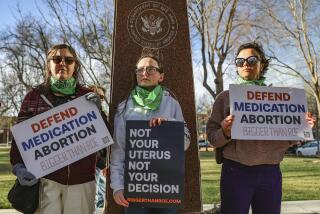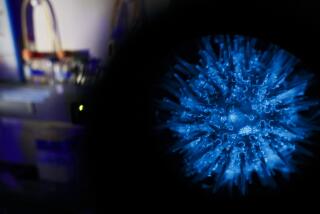Protection for Immune Systems in Transplants Reported
Two Navy researchers said Tuesday that they have devised a way to prevent the body from rejecting transplants without suppressing the whole immune system and leaving the recipient vulnerable to infections.
Preliminary experiments on monkeys suggest that the treatment also could free organ recipients from the need to take anti-rejection drugs for the rest of their lives, thereby greatly reducing the cost and complications of transplants, the researchers said.
Lt. Cmdr. Allan D. Kirk and Capt. David M. Harlan of the Naval Medical Research Institute reported at a news conference that they used synthetically created antibodies to deactivate immune cells that would normally trigger rejection of foreign organs. A monthlong treatment with the antibodies also prevented the body from recognizing the donor organs as foreign when treatment was stopped, they said.
Two monkeys treated in this fashion after receiving grossly mismatched donor kidneys have survived for more than 150 days with no further treatment and no signs of rejection, they report in the current Proceedings of the National Academy of Sciences.
The two Navy doctors, who hope to begin trials with humans within a year, say the new drugs could be in routine clinical use within five years.
“There is no doubt that this works,” Kirk said. “But we have to see how they would interact with other drugs that would be used in transplants in humans.”
“This is quite an exciting finding,” said Dr. Hans Sollinger, a transplant surgeon at the University of Wisconsin Medical Center who was not involved in the research. “I consider this a very promising start” toward work in humans.
Now, donated organs have to be very closely matched to the recipient immunologically so that they are not immediately rejected. Even then, patients must receive expensive anti-rejection drugs for the rest of their lives.
Those drugs suppress the entire immune system, leaving the patient susceptible to a broad variety of viral and bacterial infections. The drugs also produce complications ranging from diabetes and thinning of the skin to osteoporosis and kidney failure.
At least in part because of problems involving compatibility of donor organs, nearly 4,000 Americans died in 1996 while awaiting transplants, according to the United Network for Organ Sharing. About 50,000 are on waiting lists for organs.
The groundwork for the Navy study was laid by Dr. Christian P. Larsen and Dr. Thomas C. Pearson of Emory University, who last year reported similar studies with mice. They found what Kirk called “dramatic graft survival” in rodents who received similar antibodies after undergoing skin transplants, which are the hardest tissues to transplant in mice.
But mice do not provide the best test for transplant techniques because they are “much more permissive than primates,” Sollinger said, meaning that they too easily accept foreign tissue.
The Emory results thus “were a very interesting observation from a basic science standpoint, but because small animals were used, they didn’t have as much significance” as the Navy results, Sollinger said.
Monkeys, in contrast, are “extraordinarily similar to humans,” Kirk said, “and success in this model has been an excellent predictor [for success] in humans.”
“The fact that this works in large animals . . . really brings us a lot closer to being able to try this in the clinic,” Larsen said.
The Navy study involved a dozen monkeys and was aided by a University of Wisconsin physician, Dr. Stuart J. Knechtle, who transplanted grossly mismatched kidneys into all 12 animals. After the transplants, four received no treatment, and rejected the kidneys in five to seven days. Six received one or both of the two new compounds for a short term. All eventually rejected the organs.
But the final two received a 28-day course of therapy--and did not reject the organs. Although they were housed in the same laboratory with other animals, they developed no unusual infections, indicating that their immune systems were functioning normally.
The biggest hurdle that the researchers face now is that the new agents do not work in the presence of cyclosporin, the most commonly used anti-rejection drug. They could therefore not be simply added to the normal drug protocol for transplant patients, Kirk said.
Maugh reported from Los Angeles and Knight from Washington.






